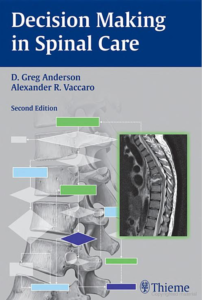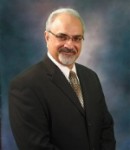 Dr. Luis Lombardi, an orthopedic surgeon specialist in non-traumatic spine surgery, has spent the last 18 years working to improve the minimally invasive techniques used in the spine. Dr. Lombardi added to his long list of peer-reviewed publications by authoring a chapter in the book Decision Making in Spinal Care, published in 2012. Dr. Luis Lombardi’s chapter is entitled Percutaneous Diskogenic Pain Treatment. Pain originated in the disc or discogenic pain is thought to be the most common cause of chronic back pain. While these condition used to be primarily treated with more invasive procedures, recent advances in spine surgery have made minimally invasive options available to some patients. In his chapter, Dr. Lombardi discusses the various surgical procedures that may be used to correct herniated discs in a manner that poses almost no risk to the patient. Herniated discs wherein the interior nucleus has not broken through the outer fibers of the disc can be treated with intradiscal (intranuclear and annular) procedures. If the nucleus has broken through the outer fibers and is in contact with the nerve root surrounding the disc, an extradiscal procedure is generally required. While extradiscal procedures are always visualized with an endoscope, intradiscal procedures may be nonvisualized. The chapter authored by Dr. Lombardi explores the following: – Nonvisualized Nuclear Procedures, including Chemonucleolysis and Percutaneous Automated Nucleotomy; – Nucleoplasty; – Annular Procedures, and – Visualized Endoscopic Intradiscal and Extradiscal Procedures.
Dr. Luis Lombardi, an orthopedic surgeon specialist in non-traumatic spine surgery, has spent the last 18 years working to improve the minimally invasive techniques used in the spine. Dr. Lombardi added to his long list of peer-reviewed publications by authoring a chapter in the book Decision Making in Spinal Care, published in 2012. Dr. Luis Lombardi’s chapter is entitled Percutaneous Diskogenic Pain Treatment. Pain originated in the disc or discogenic pain is thought to be the most common cause of chronic back pain. While these condition used to be primarily treated with more invasive procedures, recent advances in spine surgery have made minimally invasive options available to some patients. In his chapter, Dr. Lombardi discusses the various surgical procedures that may be used to correct herniated discs in a manner that poses almost no risk to the patient. Herniated discs wherein the interior nucleus has not broken through the outer fibers of the disc can be treated with intradiscal (intranuclear and annular) procedures. If the nucleus has broken through the outer fibers and is in contact with the nerve root surrounding the disc, an extradiscal procedure is generally required. While extradiscal procedures are always visualized with an endoscope, intradiscal procedures may be nonvisualized. The chapter authored by Dr. Lombardi explores the following: – Nonvisualized Nuclear Procedures, including Chemonucleolysis and Percutaneous Automated Nucleotomy; – Nucleoplasty; – Annular Procedures, and – Visualized Endoscopic Intradiscal and Extradiscal Procedures.





